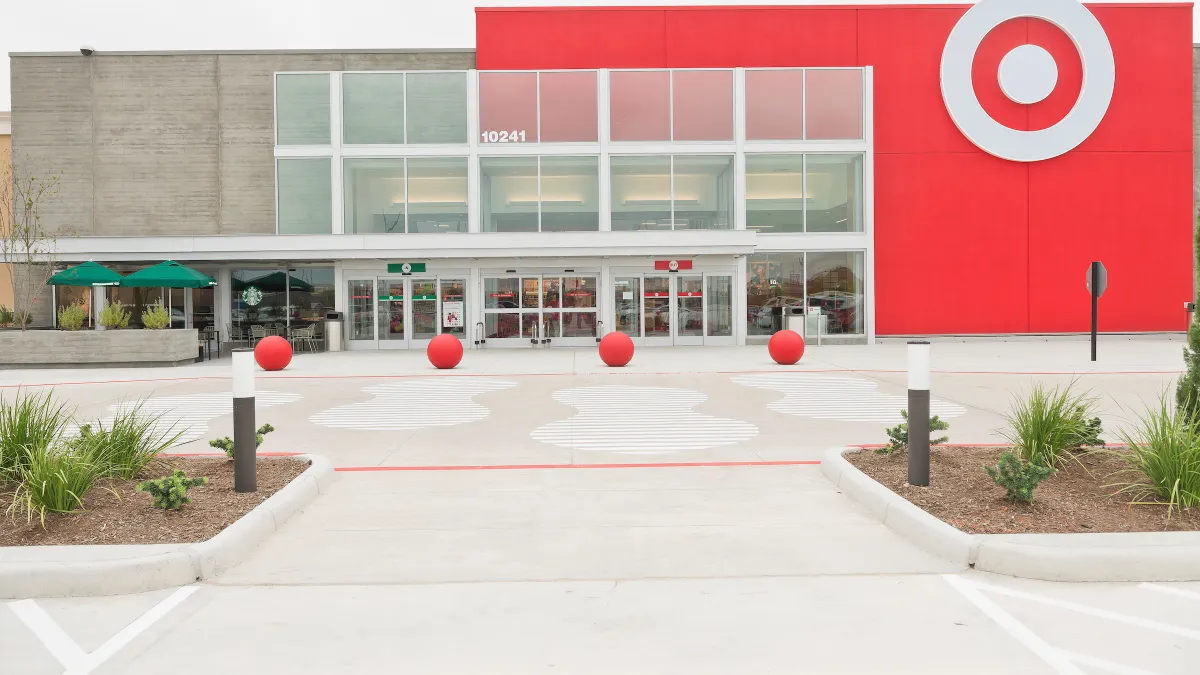Dive Brief:
- Traffic to Target stores grew 3.7% in the first quarter of the year — the strongest quarterly growth in over 10 years, executives announced Wednesday. That helped spur comparable sales up 3%. Digital sales, which includes purchases through its Drive-Up pickup program, increased 28%, the company said.
- Spending on digital fulfillment and price cuts, however, eroded margins and led to a lower-than-expected profit, which sent shares of the mass merchant down 6% in pre-market trading. Target earned a profit of $1.32 per share, shy of the $1.39 average analyst estimate, cited by Reuters. The company's first quarter gross margin rate was 29.8%, down from 30% last year. Operating income was $1.04 billion in first quarter 2018, down 9.9% from last year.
- Revenue in the quarter rose to $16.8 billion, above the $16.6 billion expected. Moving into the second quarter, executives anticipate acceleration in comps into the low to mid single-digit range.
Dive Insight:
It's been a big — not to mention expensive — quarter for Target. But CEO Brian Cornell said in a statement Wednesday that's all part of making progress on its long-term strategic initiatives. In the first quarter, Target completed 56 store remodels, opened seven stores, introduced three new brands, debuted a much-touted partnership with Hunter, added its Drive-Up pickup service to 250 stores, expanded Target Restock nationwide and rolled out same-day delivery from more than 700 stores using Shipt.
Wall Street might not be impressed, but customers sure seem to be. According to Neil Saunders, managing director of GlobalData Retail, Target is one of the clear winners of the first quarter because of its balance in investments to both digital and stores. "Our customer data show that customer satisfaction at refurbished and newer stores is running significantly higher than at older units," Saunders said in comments emailed to Retail Dive. "There is no doubt that investing in stores was an expensive decision, but we believe these numbers show it was the right move to make."
The company is also modernizing its store operating model to improve out-of-stock inventory by having employees develop an expertise on specific categories like beauty, food and beverage, electronics and apparel, executives said on a call with investors Wednesday morning.
Target has also seen growth in the number of consumers — especially among younger and family demographics — who browse and buy clothing and home goods, Saunders said. Sales growth in home, essentials and food and beverage categories offset the impact of delayed sales in some temperature-sensitive categories, the company said.
Growing private label brands in those spaces has been a big focus in the assortment over the last few months. In February, the company debuted Opalhouse, an eclectic home brand, and on Monday it announced a new kid's apparel collaboration with the Museum of Ice Cream, which will debut on June 3 in stores and online. As part of the tie-up, Target will premier seven ice cream flavors starting July 8 and the retailer will also work with The Museum of Ice Cream on an immersive experience in New York City called The Pint Shop.
The new partnership falls in line with Target's core strategy of attracting trendy brands to debut limited-edition collections, but falls outside of home decor and apparel categories that typically see these collaborations. Target is pairing up with the experiential food brand at a time when "reasonable performance on food" has become another factor underpinning the company's success, Saunders said.
As competition heats up with rivals Walmart and Amazon, Target has continued to focus on its long-term plan.
“Slight margin compression is understandable due to the various sensible strategic investment initiatives that are in process, from employees to e-commerce, as well as the impact of the competitive dynamic rippling throughout retail led by Walmart and Amazon as they continue to battle for market share using price,” Moody’s Lead Retail Analyst Charlie O’Shea said in a statement emailed to Retail Dive. “Working capital continues its favorable trend, liquidity remains robust, and Target is setting itself up for solid performance in the looming back-to-school season, which will serve as a further 'litmus test' for its investments."















